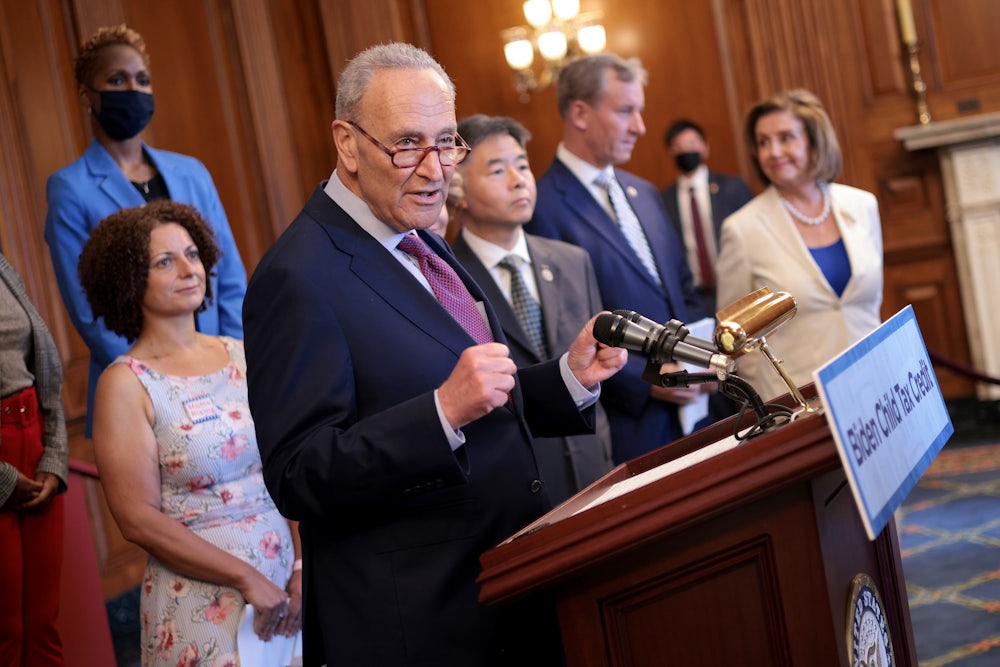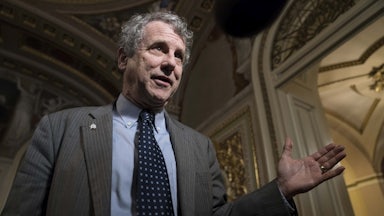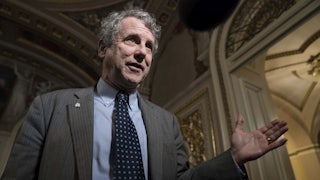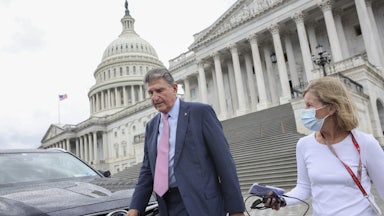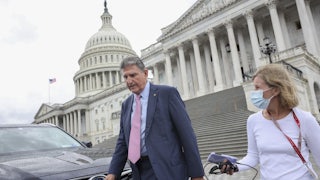With the quixotic optimism worthy of a carol pledging to be home for Christmas, Senate Majority Leader Chuck Schumer has repeatedly outlined his goal to pass the Build Back Better Act, President Joe Biden’s mammoth social spending, tax, and climate legislation, before the holiday.
“Families need to know that critical programs like the child tax credit will continue uninterrupted. This program has already done immense good for millions upon millions of families. Build Back Better will make sure these benefits stay in place,” Schumer said in a speech on the Senate floor on Monday.
If the Democrats fail to act in a timely manner, the enhanced child tax credit, which was expanded in March by the American Rescue Plan Act, will expire at the end of the month. A series of temporary changes to the credit were implemented by that $1.9 trillion coronavirus relief bill; one of the more significant among many made it fully refundable for the first time. Before this expansion, around 27 million children under 17—including roughly half of all Black and Latino children and a similar proportion of children living in rural America—received only partial credit or none at all because they belonged to households with incomes too low to qualify for the full credit. The measure also increased the amount from $2,000 per child to $3,600 for children under age 6 and $3,000 for children aged 6 through 17, for households earning under a certain threshold. Previously, families had not been able to claim their 17-year-old children for the credit.
Starting in July, the Treasury Department began issuing advance payments of the credit, allowing families to receive it on a monthly basis instead of as a lump sum during tax filing time. (Families will be able to claim the second half of their credit when they file taxes next year.) The credit reaches around 90 percent of the country’s children and can cut child poverty by 40 percent, according to the left-leaning Center for Budget Policy Priorities, or CBPP. The fourth monthly payment of the credit, distributed on October 15, kept 3.6 million children from poverty, and contributed to a 4.9 percentage point drop in the child poverty rate, according to a study by the Center on Poverty and Social Policy at Columbia University. A September study by the National Bureau of Economic Research also found that the initial payments are associated with a 7.5 percent decline in food insufficiency. But parents will not be able to continue to realize the benefits if the credit is not extended.
“The full benefit of the expansion cannot be realized in one tax cycle,” Gaylynn Burroughs, a senior policy counsel at the Leadership Conference on Civil and Human Rights, told reporters on Wednesday.
The Build Back Better Act includes a one-year extension of the expanded credit. It also makes full refundability of the credit permanent—meaning that families who do not earn enough to file income taxes are able to claim the credit—and no longer requires that children have a Social Security number to receive it. In order to continue the seamless distribution of these benefits, the IRS needs the bill to pass so it knows what changes to implement, including the tax year it should use for eligibility for the credit; the House-passed bill allows households to qualify based on their lowest income for either of the previous two years. It would also no longer peg the credit payments to inflation.
Most Democrats have expressed a desire to pass the bill in short order. “House Democrats will not allow this tax credit to expire, and I don’t believe the Senate will either,” Democratic Caucus Chair Hakeem Jeffries told reporters on Wednesday.
But the potential lack of consistency for families relying on the credit is a concern for many Democratic senators. “I think it would be a sad day for millions of working-class families who suddenly find that they’re not going to be receiving the support that they are expecting,” Senator Bernie Sanders told The New Republic.
The biggest advocates in the upper chamber for the child tax credit, Senators Michael Bennet, Cory Booker, Sherrod Brown, and Raphael Warnock, each told The New Republic that the Senate needed to approve the bill as soon as possible.
“I’m very concerned that it’s headed toward a cliff,” Booker said. Bennet argued that “we’ve cut childhood poverty almost in half; the last thing we should be doing is doubling it.” Warnock sounded a more optimistic note, predicting, “I think you’re going to see movement shortly.” Brown, who has previously insisted that extending the credit would get support from all 50 Democrats, called it “the largest tax cut in American history.”
“We want to do it, and we will,” Brown said.
Senator Jon Tester called the child tax credit a “motivational factor” in passing the Build Back Better Act. But when asked by The New Republic if he believed the bill could actually pass before Christmas, Tester replied: “Well, I think so, but Jesus, I don’t know.”
At least one Democrat is seemingly unconcerned about the expiration of the expanded credit. Senator Joe Manchin has repeatedly expressed concerns about the Build Back Better Act, worrying that it could increase inflation, and argued that it was moving too quickly. He has also worried that the bill might create an “entitlement mentality,” and suggested that the child tax credit could be tied to work requirements, which can do more to harm than to help recipients of a benefit. On Tuesday, Manchin indicated that he would be OK with the credit reverting to its previous form, that is, distributed yearly at a lower amount with no full refundability.
“The child tax credit is still in the existing law we had before,” Manchin told HuffPost. Manchin then indicated to reporters on Wednesday that he believed the credit could be distributed retroactively if Democrats did not pass the Build Back Better Act before the end of the month.
“I’ve never seen a situation where we weren’t able to make up whatever you thought time would be lost,” Manchin said, adding that “we should get the bill right.”
A CBPP report released last week estimates that, if the expanded credit is not extended, 9.9 million children will be at risk of slipping deeper into poverty. This would mean higher poverty rates for children of all demographics but would disproportionately affect Black, Latino, and Native American children. It would also increase the disparity in child poverty rates between white children and Black, Latino, and Native American children. This would also affect children in Manchin’s home state. According to the CBPP study, 346,000 children in West Virginia would be affected if the expanded credit is not extended, with 50,000 at risk of slipping back below the poverty line or deeper into poverty. The child tax credit also disproportionately aids children in rural areas, which describes much of the West Virginia landscape.
In a November survey by the Center for Law and Social Policy, or CLASP, nearly 70 percent of respondents who received the monthly payments said that the funds made them a lot or a little less stressed about money, a percentage that increased for respondents with incomes between $10,000 and $24,999. It also found that the most common way respondents reported planning to use their payments involved addressing basic needs: paying bills, buying groceries, paying rent or mortgage, buying clothes and shoes, and paying down debt. Paying for schooling and after-school activities were also common uses for the payments.
The child tax credit is not reaching everyone who could benefit. The CLASP survey found that three-quarters of respondents claimed the credit, and the majority were receiving monthly payments. The National Bureau of Economic Research study also reported that the lowest-income households were less likely to report receiving the credit than the highest-income households. For Americans too poor to file taxes, the onus is on them to register for the credit, meaning that they may not even know that they are eligible. There were also initial difficulties with the website nonfilers could use to register for the credit. If the expanded credit is extended, that provides more opportunities for it to reach the Americans who need it the most.
Sharon Parrott, the president of CBPP, told reporters on Wednesday that the credit will reach even more children if the policy continues to be “sustained.” “The most important thing is for this to become a policy that is ongoing as a matter of course,” Parrott said, explaining that it would create community awareness and allow time to build the infrastructure to distribute it in the most effective manner.
Even if the Senate manages to pass the Build Back Better Act in a timely manner, the House will need to vote on the measure again, as it is likely to be changed in the upper chamber. In the event that occurs before the end of the year, in time for the IRS to prepare for another round of checks to be sent out on January 15, Congress may be in this position again late next year when the expanded credit would be set to expire again.
There is a good chance that Republicans will retake one or both chambers in the November midterm elections, and many GOP lawmakers have expressed their opposition to the credit, denigrating it as a welfare measure. “Their next reckless spending spree proposes to double down on Democrats’ new monthly welfare deposits that can flow directly to people who are here illegally,” Senate Minority Leader Mitch McConnell said in October, referring to the provision that will allow children without a Social Security number to receive the credit.
GOP Senator Mitt Romney, who has introduced his own child tax credit plan, expressed frustration that Democrats “are not meeting with any Republicans on any of our proposals.… This is the downside of using the reconciliation process to take on a topic as important as childcare in America. And to only have one party do that, suggests that when my party is in power, we’re going to change it,” Romney told The New Republic.
So passing the Build Back Better Act is just the next battle in the longer-term war to make this version of the expanded credit permanent.
“We need to get that passed, and then we’ll keep working on extending it further after that,” Representative Suzan DelBene, one of the most vocal supporters of the child tax credit in the House, told The New Republic.
